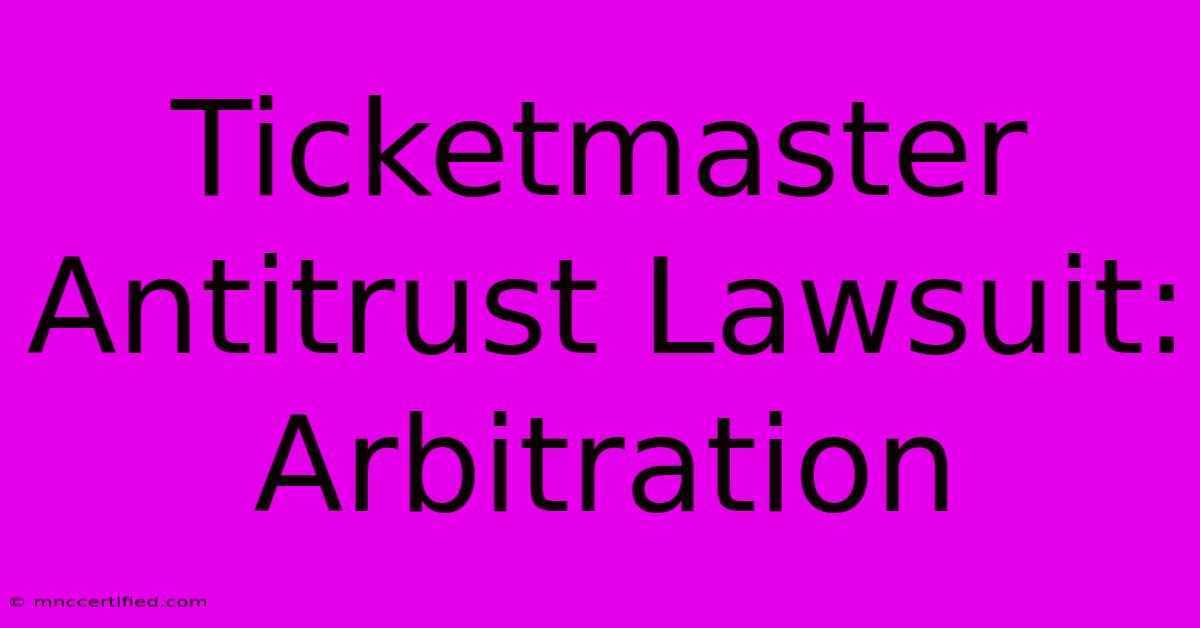Ticketmaster Antitrust Lawsuit: Arbitration

Table of Contents
Ticketmaster Antitrust Lawsuit: Arbitration – Navigating the Legal Maze
The Ticketmaster antitrust lawsuit has sparked widespread debate, particularly concerning the arbitration clauses embedded within its terms of service. This article delves into the complexities of Ticketmaster's arbitration process, explaining its implications for consumers and exploring potential legal avenues for redress.
Understanding the Ticketmaster Arbitration Clause
Ticketmaster, like many large corporations, incorporates mandatory arbitration clauses in its terms and conditions. This means that instead of pursuing a class-action lawsuit in court, disputes are resolved through private arbitration. While seemingly designed for efficiency, this clause has drawn significant criticism for several reasons:
-
Waiver of Class Action Rights: The most controversial aspect is the waiver of class action rights. This prevents consumers from joining together to sue Ticketmaster collectively, significantly reducing the leverage against a powerful corporation. Individual claims against Ticketmaster are often too small to justify the cost of litigation, effectively silencing many aggrieved customers.
-
Lack of Transparency and Fairness: Critics argue that the arbitration process lacks transparency and is weighted in favor of Ticketmaster. The arbitrators are often chosen by Ticketmaster, raising concerns about impartiality and the potential for biased decisions. The process itself can be opaque and costly for consumers, potentially dissuading them from pursuing their claims.
-
Limited Discovery: Compared to court proceedings, the discovery process in arbitration is typically more restricted. This limits the ability of consumers to gather evidence needed to build a strong case against Ticketmaster.
The Antitrust Allegations Against Ticketmaster
The antitrust lawsuit against Ticketmaster centers on allegations of monopolistic practices, including anti-competitive behavior and price gouging. These allegations involve accusations of:
-
Market Domination: Ticketmaster's significant market share allows it to dictate prices and control the ticketing process, allegedly harming consumers and artists alike.
-
Exclusive Contracts: Critics argue that Ticketmaster's exclusive contracts with venues prevent competition and limit consumer choice.
-
Hidden Fees: Consumers often encounter unexpected and exorbitant fees added to the initial ticket price, leading to accusations of deceptive pricing.
These allegations, if proven, could constitute violations of antitrust laws, providing grounds for legal action even in the face of the arbitration clause.
Challenging the Arbitration Clause: Potential Legal Strategies
Despite the arbitration clause, consumers have several potential legal strategies to challenge Ticketmaster's practices:
-
Unconscionability Arguments: Lawyers may argue that the arbitration clause is unconscionable, meaning it is so one-sided and unfair that it should not be enforced. This argument focuses on the imbalance of power between Ticketmaster and its customers.
-
Federal Arbitration Act (FAA) Exceptions: The FAA, while generally enforcing arbitration agreements, contains exceptions. Arguments can be made that the arbitration clause violates public policy or that Ticketmaster engaged in fraud or misrepresentation in obtaining consumers' consent.
-
State Law Challenges: Some state laws provide additional avenues to challenge arbitration clauses, offering potential legal recourse for consumers.
The Importance of Legal Counsel
Navigating the complexities of the Ticketmaster arbitration clause requires expert legal counsel. An attorney specializing in antitrust law and arbitration can assess the viability of challenging the clause and advise on the best course of action. The cost of legal representation should be carefully considered against the potential benefits of challenging Ticketmaster's practices.
Conclusion: A Fight for Consumer Rights
The Ticketmaster antitrust lawsuit and its related arbitration clauses highlight a broader struggle for consumer rights in the digital age. While arbitration offers a seemingly quicker alternative to traditional litigation, the potential for bias and the silencing of collective action raise significant concerns. Understanding the legal options available and seeking experienced legal representation is crucial for consumers seeking redress against powerful corporations like Ticketmaster. The fight for fair pricing and competitive practices in the ticketing industry is far from over.

Thank you for visiting our website wich cover about Ticketmaster Antitrust Lawsuit: Arbitration. We hope the information provided has been useful to you. Feel free to contact us if you have any questions or need further assistance. See you next time and dont miss to bookmark.
Featured Posts
-
Embrace Pet Insurance Referral
Nov 27, 2024
-
Empty Shelves At Morrisons Shopper Anger
Nov 27, 2024
-
Wildlife Photography Top 25
Nov 27, 2024
-
Walmarts Revised Dei Initiatives
Nov 27, 2024
-
Bravo Renews Vanderpump Rules Season 12
Nov 27, 2024